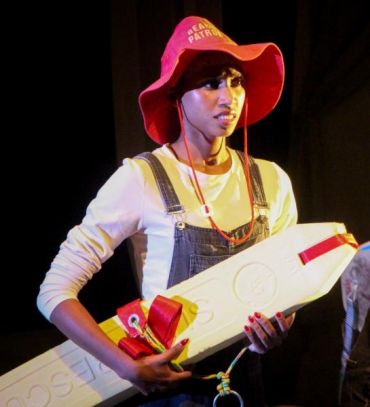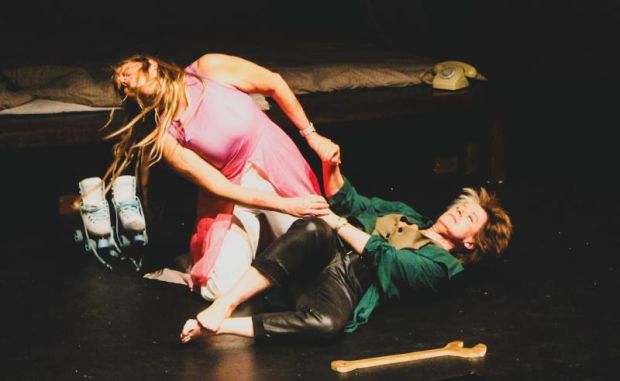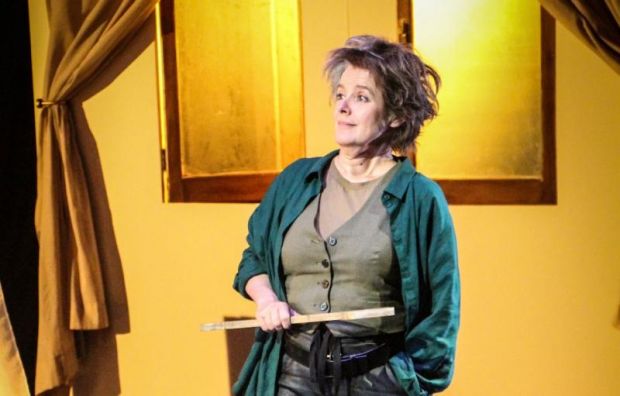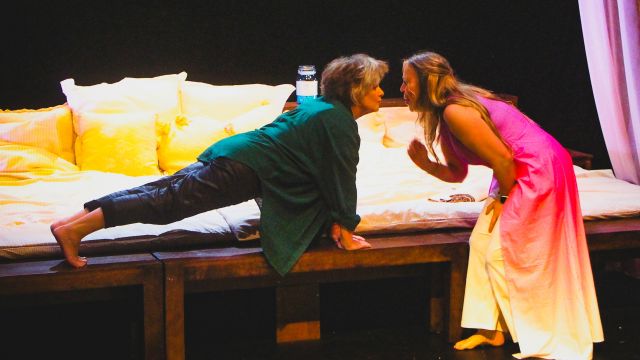Skating in the Clouds
Skating in the Clouds is a richly metaphoric work, which playwright Clare Mendes describes as a fairy tale; it’s about the pressing (though if you listen to our leaders, you wouldn’t think so) problem of climate change, or global warming – and species extinction and food security - and the varied ways in which we beleaguered, anxious humans respond to these things. There’s no Fairy Godmother in this fairy tale. If our responses range from defeatism and suicidal depression through to Pollyanna-ish denial, well, that’s the way it is…
 Autumn (Rebecca Morton), a pessimistic environmental engineer and academic, and Summer (Katrina Mathers), Pilates teacher, single mum, dancer and skater, fall in love. Opposites attract? But this pair never quite connect. Autumn, in her tough, practical work clothes, pre-occupied, worried, frustrated (with Summer too), carries a spanner, always looking for a dripping leak she can’t find. But Summer, in her wafty party outfit (design is by Bianca Pardo) dreams of a huge seventieth birthday party on that important date 2040, at which a panoply of famous and accomplished women (a touch of Caryl Churchill’s Top Girls?) will celebrate – and skate on ice. Summer, who is rather muddled - as she needs to be - insists the ice is already there. Or it will be…. Can’t Autumn see it?
Autumn (Rebecca Morton), a pessimistic environmental engineer and academic, and Summer (Katrina Mathers), Pilates teacher, single mum, dancer and skater, fall in love. Opposites attract? But this pair never quite connect. Autumn, in her tough, practical work clothes, pre-occupied, worried, frustrated (with Summer too), carries a spanner, always looking for a dripping leak she can’t find. But Summer, in her wafty party outfit (design is by Bianca Pardo) dreams of a huge seventieth birthday party on that important date 2040, at which a panoply of famous and accomplished women (a touch of Caryl Churchill’s Top Girls?) will celebrate – and skate on ice. Summer, who is rather muddled - as she needs to be - insists the ice is already there. Or it will be…. Can’t Autumn see it?
Shamita Sivabalan and El Kiley, meanwhile, contribute a variety of amusing pop-on characters – sometimes journalists, sometimes a kind of Chorus. Sivabalan plays Summer’s grumpy son Toby very well, a fatalistic but impatient boy who knows his Mum just doesn’t get it. Kiley, despite her very limited time on stage, is unforgettable with her lively, charming presence.

Skating is, appropriately here, a term with several meanings. Simple ice skating, or fancy figure skating, on ice, gliding beautifully. But there’s also ‘skating on thin ice’ (what Autumn thinks the world is doing, ignoring imminent disaster), and ‘skating over’, that is, denying something crucially important (what Autumn thinks Summer and the rest of the world are doing). And so, Summer and Autumn go on. As they and their relationship and the world outside evolves – or presses in on them – Summer’s denial becomes more wilful, more desperate, and Autumn resigns herself to doing the best she can on the edges – going to probably futile conferences (COP27, anyone?), helping vineyards improve their productivity and so on – that is, doing her bit because it’s all she can do, ameliorating.

Charting these changes in Autumn and Summer is the real strength of Mendes’ play. Their changes are truthful and poignant. Unfortunately, perhaps, these developments come in the second half of the play. Lacking any strong narrative per se, Mendes falls back on her characters stating and insisting on their positions rather too often. Yes, the issues and the sources of conflict are important, but they don’t need repeating in scene after scene. Skating in the Clouds has things worth saying, but just saying them doesn’t make for drama: those things need more than statement. They need a plot to hang them on.
Michael Brindley
Photographer: Anna Moloney-Heath
Subscribe to our E-Newsletter, buy our latest print edition or find a Performing Arts book at Book Nook.

